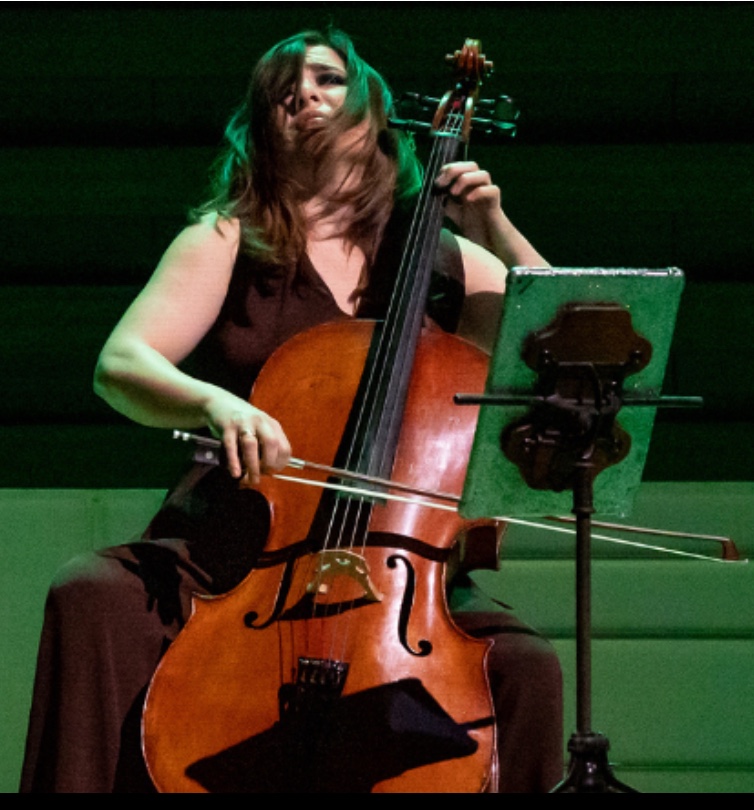By Daniel Hathaway
. Guest performances by andPlay and Alisa Weilerstein (pictured), Apollo’ Fire revisits Bach’s coffeehaus with a new playlist
. Pintscher to lead KC Phil
. Almanac: revisiting a W.G. Still opera
HAPPENING TODAY:
Tonight, the new music ensemble No Exit will present andPlay, the NY-based violin & viola duo of Maya Bennardo and Hannah Levinson in “Translucent Harmonies,” an immersive experience in sound, silence, and resonance, at SPACES gallery.
Also tonight, Cleveland-born cellist Alisa Weilerstein will unveil her COVID lockdown project Fragments I, which enhances Bach’s first solo cello suite with newly commissioned works enhanced by lighting and scenic architecture. A talk with the creative team that put this all together follows her performance at Severance.
And Apollo’s Fire presents “A Return to Bach’s Coffeehouse” with a new playlist led by assistant artistic director and violinist Alan Choo, in multiple performances at St. Paul’s Episcopal in Cleveland Hts. tonight, on Friday, May 12 and Saturday, May 13, and at Rocky River Presbyterian on Sunday afternoon, May 14.
NEWS BRIEFS:
Pintscher to lead KC Phil:

“His appointment on a five-year contract was announced Tuesday. The 52-year-old had not led the orchestra or been to Kansas City until arriving for rehearsals two days ahead of concerts from March 3-5.
“It didn’t feel like a debut, didn’t feel like a first encounter,” Pintscher said in a telephone interview. “It was spontaneous, inspired. They cared so much about the colors and everyone was so tuned into enhancing the phrasing and articulation. They were so responding to my gestures, to my eyes.”
Pintscher, who now teaches at Juilliard, held a Daniel R Lewis Young Composer Fellowship with the Cleveland Orchestra from 2000 to 2002. His
His 2012 double trumpet concerto Chute d’Étoiles – Hommage à Anselm Kiefer, inspired by Stravinsky, was debuted by The Cleveland Orchestra at the Lucerne Festival in 2012 and the work received its U.S. premiere at Carnegie Hall.
ALMANAC FOR MAY 11:
American composer William Grant Still was born in Mississippi on this date in 1895 (some sources give the year as 1898). The full extent of Still’s oeuvre has yet to be explored by conductors and performers, including his numerous operas.
Why? Differing responses by the public and the critics to his 1949 work, Troubled Island, with a libretto begun by Langston Hughes, suggest that racism played a part in the fate of a work that received 22 curtain calls at its premiere by New York City Opera but was panned or ignored by the press. Listen to the entire work, conducted here by Laszlo Halasz, and read the comments, which include notes on the opera.
On the other hand, Still’s works were received with enthusiasm when the composer wasn’t mentioned. Case in point: his “rousing and amiable” Festive Overture, which won first prize among 39 anonymously submitted pieces in a 1944 competition sponsored by the Cincinnati Symphony. Click here to watch a performance by John McLaughlin Williams and the Cleveland Institute of Music Orchestra.
In a nice coincidence, on this date in 1963, University of Miami Opera gave the first performance of Still’s opera Highway 1, U.S.A. (originally titled A Southern Interlude). Click here (part one) and here (part two) to listen to the 2005 premiere recording by the St. Olaf Orchestra and Vocal Essence led by Philip Brunelle.
Lest we be accused of only noting high-minded anniversaries in this Almanac, let’s raise a glass to American songwriter Septimus Winner, born in Philadelphia on this date in 1827, the seventh child of a luthier (hence his given name). In an interesting reversal of the way things usually work, he wrote some of his popular ballads under the nom de plume of Alice Hawthorne. Taking its time, the Songwriters Hall of Fame finally inducted him into its pantheon in 1970.
You’ll wonder, if you haven’t already, who wrote such immortal Civil War era songs as Listen to the Mockingbird, which sold some 20 million copies of sheet music, or the exceedingly popular Oh Where, oh Where has Mine Little Dog Gone, set to the German folk tune “In Lauterbach hab’ ich mein’ Strumpf verlor’n.” His Ten Little Injuns, originally published in 1864, became a standard in minstrel shows after it was re-texted (though not by Winner) with an even more unfortunate racial reference. Now, having done our archival duty, we’ll let him fade into the oblivion he richly deserves.




